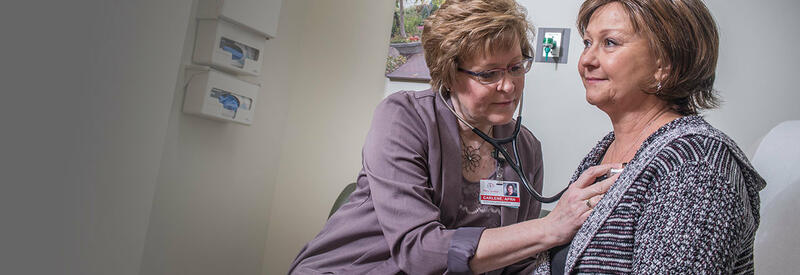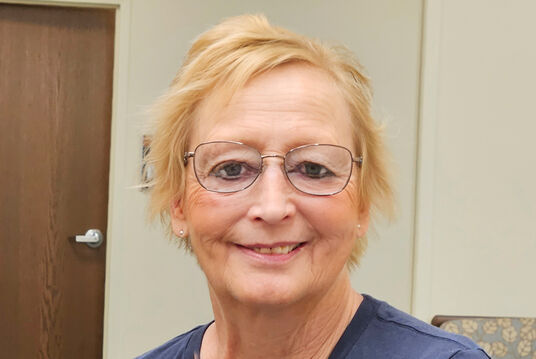

Patient Services

Morrison Cancer Center is proud to provide leading cancer care to the patients who seek our services. We’re devoted to making patients and their families feel comfortable in our warm, inviting environment.
Getting Started
Visiting a new clinic means you will be introduced to new processes. During your first visit, we will ask for demographic information, as well as copies of health insurance and prescription cards. Please bring these cards with you. You will receive more information regarding your cancer and treatment during your first visit.
Nursing, Hematology, Laboratory & Radiology
Nursing
Our oncology nurses are an important part of your healthcare team. They have received specialized training, have a thorough understanding of treatment regimens and side-effects, and are proficient in chemotherapy preparation and administration. Many of our infusion nurses have earned Oncology Nursing Certification (OCN). Oncology nurses are aware of the needs and fears of both the patient and family, and are comfortable discussing all aspects of care. Use our nurses’ experience to answer questions and express concerns.
Hematology
A hematologist is a physician who treats patients with blood diseases associated with blood cells and the blood-forming organs. The first curable cancers – lymphoma and leukemia in the 1950's – were blood disorders treated by chemotherapy; consequently, hematology and oncology are closely linked.
On-Site Laboratory
Our on-site lab allows patients to receive most testing on-location and delivers test results in a fast and efficient manner. Bone marrow biopsies can be performed in our procedure room.
Clinical laboratory testing plays a critical role in the detection, diagnosis and treatment of many diseases, including cancer. Laboratory Technologists perform most of these tests here in our office. They examine and analyze blood and other body fluids utilizing state-of-the-art equipment to provide your physician with information to prescribe the best treatments and/or preventive measures.
Radiology
We are pleased to offer in-house CT and PET scan services. Radiology procedures are used in cancer treatment to aid your physician in staging, diagnosis and evaluation of treatment effectiveness.
CT Scans
Computed Tomography (CT) scan, also called Computerized Axial Tomography (CAT) scan, is used to create cross-sectional images of structures in the body. In this procedure, x-rays are taken from many different angles and processed through a computer to produce a 3-D image called a tomogram. CT scans are pictures taken by a specialized x-ray machine. The machine circles your body and scans an area from every angle within the circle. The machine measures how much the x-ray beams change as they pass through your body. It then relays that information to a computer, which generates a collection of black and white pictures, each showing a slightly different “slice” or cross-section of your internal organs. Because these “slices” are spaced only about a quarter-inch apart, they give a very good representation of your internal organs and other structures. Physicians use CT scans to evaluate all major parts of the body, including the abdomen, back, chest and head.
PET Imaging
The power of advanced molecular imaging provided by Positron Emission Tomography (PET), combined with the detailed anatomic images provide by Computed Tomography (CT), has enhanced the diagnosing, staging and re-staging of cancer patients. One of PET’s most important applications is assisting physicians in detecting cancer before structural changes become apparent through traditional imaging methods. Fused PET/CT images can be used to target radiation treatment more accurately and to monitor the effects of chemotherapy, surgery, and radiation treatment. Metabolic and anatomic whole-body staging of patients can be performed in one examination and reduce scan times, thus increasing patient comfort. PET/CT has another advantage over CT or MRI alone, in that a PET/CT scan can examine large areas of the body in a single scanning session, producing images of body functions unavailable by other imaging techniques.
Infusion Area
Our infusion area is designed to provide a comfortable atmosphere conducive to patient needs while receiving chemotherapy and education about his or her treatment regimens. While relaxing in comfortable recliners during treatment, patients may watch TV or a DVD on their individual flat screen, listen to a CD, read a book, or even put together puzzles. Soft drinks, juice and snacks are also offered.
Our nurses are committed to assisting patients and their families by providing continual education about treatment-related issues and offering personal nursing care. Every infusion staff member is trained in biotherapy and chemotherapy administration. Many of our registered nurses are certified in oncology and all nurses are involved in ongoing education to learn the latest treatments and newest trends in patient care.
Counseling Services
A diagnosis of cancer can be devastating, generating many thoughts, feelings and fears. Each patient deals with these concerns differently. Some cope through exercise, talking with friends and family, attending church, and/or joining a support group. If you are having difficulty coping with your diagnosis or treatment, talk to your physician. You may benefit from talking with a counselor.
Support Groups
Many organizations support patient advocacy and cancer research. These groups serve cancer patients and their families with advice, community resources and help in coping with a cancer diagnosis. Many also contribute to cancer research.
Joining a cancer support group can provide a source of strength for patients and families.





